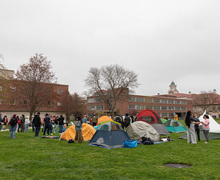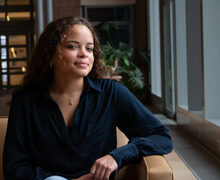New York Times columnist to describe experiences reporting overseas
Nicholas D. Kristof has lived on four continents and traveled to 140 countries.
But Wednesday night, the two-time Pulitzer Prize winner, author and Rhodes Scholar will be in Syracuse, speaking at 7:30 p.m. in Hendricks Chapel as part of the Syracuse University Lecture series.
Kristof plans to speak about what he has experienced and witnessed while working as a columnist for The New York Times, said Esther Gray, special assistant for academic affairs. He was chosen for the series because of his writings about topics, such as war, genocide and gender abuse, that influence thousands of people every day, Gray said.
His campus presentation has been timed to coincide with the College of Arts and Sciences SU Humanities Center’s two-day symposium, ‘Lay Down Your Weapons: Writing Against War,’ Gray said.
Kristof graduated from Harvard College and went on to receive the Rhodes Scholarship at Oxford University. He has been writing for The New York Times since 1984, mostly contributing his op-ed humanitarian columns. He has traveled to Darfur to cover its ongoing genocide and reported from China’s Tiananmen Square when the government brutally broke up a pro-democracy rally in 1989.
In 2006, Kristof was awarded his second Pulitzer Prize for Commentary ‘for his graphic, deeply reported columns that, at personal risk, focused attention on genocide in Darfur and that gave voice to the voiceless in other parts of the world,’ according to the Pulitzer Prize website.
Eileen Strempel, assistant vice president for academic advancement in enrollment management and associate professor of fine arts, said she hopes the SU community can be encouraged and challenged by critically reflecting on the examples Kristof presents.
‘Kristof has always struck me as the ideal investigative reporter: intellectually brilliant, insatiably curious and ethically engaged with the big questions,’ Strempel said. ‘To spend an evening with someone I think of as being our country’s moral compass seems to me to be a remarkable privilege.’
One of Kristof’s latest articles on entrepreneurs who established non-governmental organizations in their basements is an example of what Strempel described, she said. She said his coverage of the NGOs was balanced and provided moral support for visionaries while posing questions concerning whether their efforts would last.
Zoravar Sethi, a graduate student studying law and business administration, said he thinks Kristof’s lecture could broaden the mind.
‘You will become more aware of what’s happening in the world right now and possibly be more inclined to pursue things that would make an impact,’ Sethi said.
Sethi said he looks forward to hearing what else Kristof has to say about social justice issues, such as the Israeli-Palestine conflict.
Shawn Trifoso, a junior philosophy and psychology major, said he thinks the Kristof lecture will give students a worldwide perspective of current events.
Said Trifoso: ‘It could motivate people to be more altruistic and have more of a sense of the other.’
Published on November 2, 2010 at 12:00 pm




